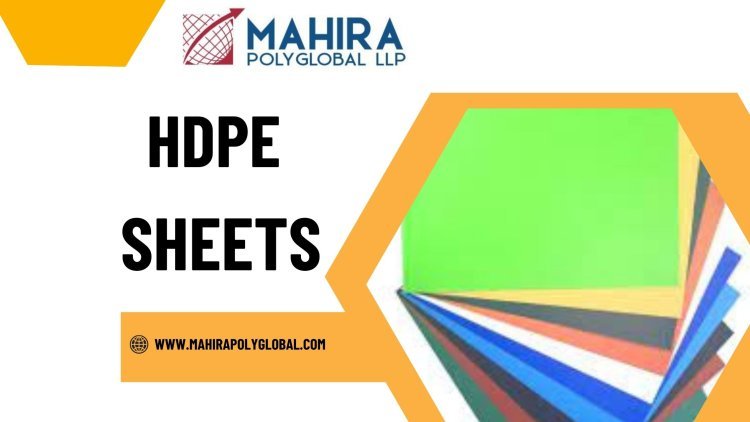The Environmental Benefits of Choosing Recyclable HDPE Sheets
The Environmental Benefits of Choosing Recyclable HDPE Sheets

High-Density Polyethylene (HDPE) sheets have gained significant attention in recent years for their durability, versatility, and eco-friendliness. As industries and consumers become more environmentally conscious, the demand for recyclable materials is on the rise. HDPE sheets, being recyclable, offer numerous environmental benefits that make them an excellent choice for various applications. This article will explore these benefits, while also discussing the characteristics, uses, and cost considerations associated with HDPE sheets, particularly from Mahira Polyglobal LLP.
Understanding HDPE Sheets
HDPE sheets are made from high-density polyethylene, a robust thermoplastic that is highly resistant to impact, chemicals, and moisture. This material is known for its lightweight yet durable properties, making it a popular choice across various sectors, including construction, agriculture, and manufacturing. One of the standout features of HDPE sheets is their recyclability, which contributes significantly to reducing waste and environmental impact.
Environmental Benefits of Recyclable HDPE Sheets
1. Reduction of Plastic Waste
One of the most pressing environmental issues today is plastic waste. Traditional plastics often end up in landfills, where they can take hundreds of years to decompose. However, High Density Plastic Sheets are designed to be recyclable. When they reach the end of their life cycle, they can be collected, processed, and reformed into new products, significantly reducing the amount of plastic waste in landfills.
2. Lower Carbon Footprint
Recycling HDPE sheets leads to a reduction in greenhouse gas emissions. The process of creating new products from recycled materials generally requires less energy compared to producing them from virgin materials. By choosing recyclable HDPE sheets, industries can lower their overall carbon footprint, contributing to global efforts against climate change.
3. Conservation of Resources
Using recycled HDPE sheets means less reliance on virgin resources. The extraction and processing of raw materials consume significant natural resources, including water and fossil fuels. By recycling HDPE, we conserve these resources, promoting a more sustainable approach to manufacturing.
4. Sustainable Manufacturing Practices
Many manufacturers are adopting sustainable practices by integrating recycled materials into their production processes. By choosing recyclable HDPE sheets, businesses can demonstrate their commitment to environmental stewardship. This not only enhances their brand reputation but also meets the growing consumer demand for eco-friendly products.
5. Promoting Circular Economy
The circular economy model aims to keep resources in use for as long as possible, reducing waste. HDPE sheets fit perfectly into this model, as they can be recycled and repurposed repeatedly. By supporting products made from recyclable materials, consumers and businesses contribute to a more circular economy, where resources are continually cycled back into the supply chain.
Applications of HDPE Sheets
Sheet of Hdpe are utilized in various industries due to their robust properties and recyclability. Here are some notable applications:
- Construction: HDPE sheets are used for wall panels, roofing, and vapor barriers due to their moisture resistance and durability.
- Agriculture: In farming, HDPE sheets serve as protective covers, mulch films, and liners for ponds, helping to improve crop yield and conserve water.
- Manufacturing: They are commonly employed in manufacturing components, machine guards, and conveyor belts due to their high wear resistance.
- Food Processing: Food-grade HDPE sheets are essential for food storage and processing applications, ensuring safety and hygiene.
- Signage: Colored HDPE sheets are widely used for outdoor signage, benefiting from their UV resistance and aesthetic appeal.
Cost Considerations
When evaluating HDPE sheets, it's important to consider the polyethylene sheet price. While the initial cost of high-density plastic sheets may vary depending on thickness, size, and supplier, investing in recyclable materials often pays off in the long run. The price for HDPE sheets typically ranges from $2 to $5 per square foot, but prices can fluctuate based on market conditions and specific requirements.
Why Choose Mahira Polyglobal LLP?
Mahira Polyglobal LLP is a trusted supplier of HDPE sheets, providing high-quality, recyclable products. They emphasize sustainable practices and offer a range of HDPE sheets tailored to various applications. Choosing Mahira Polyglobal LLP not only ensures you receive quality products but also supports your commitment to environmental responsibility.
Conclusion
Choosing recyclable Polyethylene Sheet Price is a responsible decision that aligns with sustainable practices and environmental conservation. With benefits such as reducing plastic waste, conserving resources, and promoting a circular economy, HDPE sheets represent an eco-friendly option for various industries. By selecting high-density plastic sheets from reputable suppliers like Mahira Polyglobal LLP, you can contribute to a healthier planet while enjoying the durability and versatility that HDPE sheets offer. Making the switch to recyclable materials not only benefits the environment but also positions businesses as leaders in sustainability.
Frequently Asked Questions (FAQ)
1. What are HDPE sheets made of?
HDPE sheets are made from high-density polyethylene, a strong and durable thermoplastic known for its resistance to impact and chemicals.
2. Are HDPE sheets recyclable?
Yes, HDPE sheets are fully recyclable. They can be collected and processed to create new products, reducing waste and environmental impact.
3. What is the average price of polyethylene sheets?
The price of HDPE sheets typically ranges from $2 to $5 per square foot, depending on the thickness, size, and supplier.
4. What are the common applications of HDPE sheets?
HDPE sheets are used in construction, agriculture, manufacturing, food processing, and signage, among other industries.
5. How do recyclable HDPE sheets benefit the environment?
Recyclable HDPE sheets help reduce plastic waste, lower carbon emissions, conserve natural resources, and promote a circular economy.
6. Where can I buy HDPE sheets?
You can purchase HDPE sheets from various suppliers, including Mahira Polyglobal LLP, which offers a wide selection of high-quality recyclable sheets.
7. What types of HDPE sheets are available?
HDPE sheets come in various types, including standard, colored, textured, UV-stabilized, and food-grade options to suit different applications.
What's Your Reaction?

















